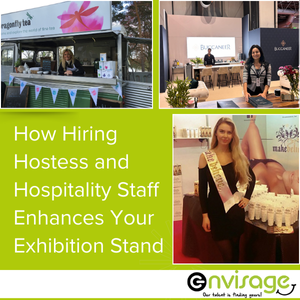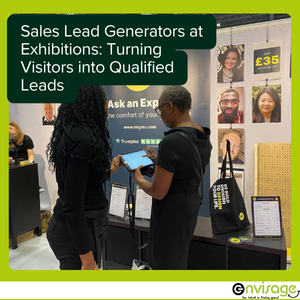Why Hiring Hostess and Hospitality Staff Improves Your Exhibition Stand Experience Exhibitions give businesses the…
5 Exhibition Staff Training Tips To Ensure a Success
Exhibiting is a specific and unique way to market a product or service. At an exhibition, the major point of interaction between your guests and your brand is the team that’s operating the stand. Aside from having an eye-catching presentation, you’ll want to make sure that the appearance, attitude, body language and expertise of your staff are up to par. Hire professional staff members who are used to presenting brand information at showcases. Then, train your team properly so that they’ll excel when manning the booth.
Company and Product Education
In order to be valuable to your brand, your staff must understand why your company is exhibiting. When team members can relate to the core strategy of your business, they’re better able to meet certain targets. Additionally, arm your staff with company and product knowledge. They should be able to confidently reply to all guest questions without searching for the answer or asking a workmate.
Booth Etiquette
In order to have a successful, approachable exhibition stand, your staff must adhere to booth etiquette best practices. No matter what type of company you run, exhibition staff should never be texting or talking on the phone; eating, drinking or chewing gum; sitting down; or in deep conversation with each other. When guests see staff members who are distracted, they’re likely to avoid the booth as it doesn’t give off an inviting atmosphere.
Also consider how your booth’s etiquette rules match your brand image. Think about the brand voice and how your team can personalize that style after all they will be your brand ambassadors. For example, you don’t want team members to be lax and chat with each other, but you may want them to dress in casual clothes and use informal wording when speaking with guests.
The Introduction and First Impression
Visitors will make an assessment about your exhibition stand within just the first few seconds of seeing it. There won’t be another opportunity to make a great first impression. Instead of asking customers if you can help them, greet them with a question that will promote a discussion. As a rule of thumb, open-ended questions are better at encouraging conversation because they require more than a one-word response. Whatever you do, stay away from the direct sell approach, which is an antiquated way to market a brand. Instead, your goal should be to engage with potential customers on a more relaxed and human level.
Conversion Signals
Exhibition guests are a varied bunch, with different interests and goals. Your team will need to make quick decisions when it comes to separating potential clients from people who are simply looking to gather information or who only want to collect freebies. Your staff should know how to recognize the attendees who are genuinely interested in becoming a customer. While there are more intricate differences between guests, many will fall into one of three categories:
- Very Interested: These guests will approach your booth because they’ve been personally invited or because they are interested in your product, service or company.
- Curious: These guests may not have previous knowledge of your brand, but they will pause and look at your booth as they stroll past.
- Not Interested: These guests will walk past the booth without slowing down or even glancing over. They may even go out of their way to avoid you.
Additionally, exhibition staff should be prepared for competitors to take a walk by your stand. A helpful practice is to have your team walk around the showcase to get a feel for the companies that are represented and to take note of the people who are behind the stands.
Health and Wellness Necessities
Exhibition halls and events can vary greatly, which is why even the most experienced staff members will need a rundown of the basics. Let everyone know ahead of time what they should wear and clearly explain details about breaks, like when and where they should be taken. Remind staff members to eat before their shift starts and let them know where they can find food if the event stretches for several hours. If you overwork your staff and leave them without the essentials, they’ll perform poorly and you’ll put your exhibition goals in jeopardy.




